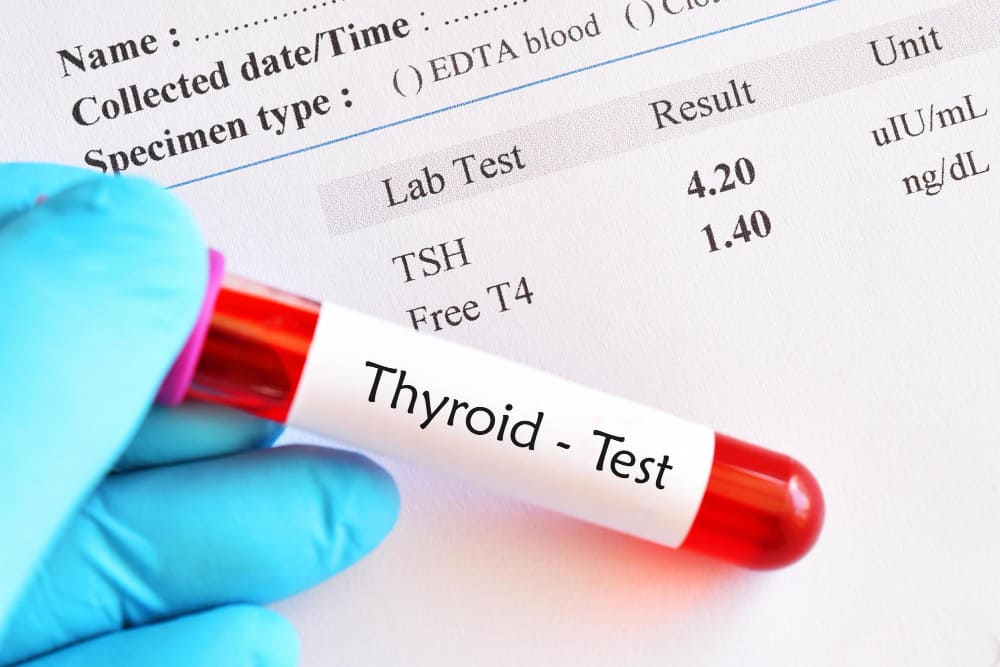Book on Whatsapp
9892101616
What to Expect from a Thyroid Test: A Comprehensive Guide
Thyroid
Tue Nov 12 2024
Doctors prescribe thyroid function tests to check if thyroid glands are working to their optimum or experiencing problems. It regulates different body organs and supports growth and metabolism. The test determines the thyroid’s functionality. Proper preparation
ensures accurate results.
More About the Test
This comprehensive thyroid test measures hormone levels produced by the thyroid gland. It checks the efficiency level of the thyroid during hormone production. Two common hormones T3 (Triiodothyronine) and T4 (thyroxine) are checked during the test. They control temperature and metabolism. Diverse tests are conducted based on the patient’s needs. TSH (Thyroid-stimulating hormone), and thyroid antibodies are also undertaken. Detailed reports show thyroid functionality, enabling the doctor to diagnose related disorders.
Importance of Thyroid Function Test
A malfunctioning thyroid gland may cause diverse health problems. Patients may experience symptoms like fatigue or mood swings. Neglecting this issue can impact the patient mentally and physically. Besides this, the test diagnoses hyperthyroidism and hypothyroidism. Evaluating hormone levels helps doctors to monitor thyroid functioning. Patients can avail
of appropriate treatment on time. Early detection prevents complications while improving life quality.
What Should Patients Expect During the Test?
The nurse draws some blood samples from the patient’s arm. The collected sample undergoes thorough analysis in the lab. Patients get the test results after some days. A qualified professional interprets the test results. They evaluate the specific situation and
offer guidance. Patients should stay prepared for the test to derive correct results.
Test Types Conducted
1. Triiodothyronine measures T3 levels in the bloodstream. 80-200 ng/dL.
2. Thyroxine measures the T4 level in blood. 4.5-12.0 ug/dL.
3. Thyroid stimulating hormone measures TSH levels in the blood. It indicates thyroid gland performance. 0.4-4.0 mIU/L.
4. Thyroid Antibody tests determine antibody levels in the bloodstream attacking the thyroid gland. It could be autoimmune
thyroid disease.
Preparation Steps
1. Certain medicines could impact test results. Inform the doctor about medications presently taken. It includes supplements and OTC drugs.
2. Do not consume iodine-rich foods as it could impact the test results. Fasting may be required based on their doctor’s instructions.
3. Carry along necessary documents, like medical insurance, or identification. These documents help streamline the entire
process while ensuring a smooth experience.
4. Wear comfortable loose-fitting clothes. Do not wear multiple layers or tight sleeves as they could hinder the test and
cause discomfort.
Test Duration
It varies based on diverse factors like the facility’s resources, efficiency, experience, and tests to perform. Usually, the procedure might take a couple of minutes. Consider additional time to accommodate check-in, queries, waiting period, seeking guidance, and preparation. The collected blood sample is sent to the lab for analysis. Report time might vary depending on complexity. The facility will provide information about when to expect the results.
What Happens After the Test?
The doctor reviews the test reports and determines the steps based on the collected information. No further action is necessary for normal thyroid function. However, inconclusive or abnormal results may require additional appointments or further testing.
The doctor monitors the thyroid function and prescribes necessary treatment-related adjustments. If you have concerns or notice fresh symptoms, contact the doctor.
Related Tests
Related Packages
Related Blogs

Thyroid
When Should You Be Tested for Thyroid Conditions? Early Signs You Shouldn’t Ignore
Though small and often overlooked, your thyroid gland is a powerhouse when it comes to keeping you balanced. It helps control metabolism, energy levels, heart rate, mood, digestion, and other key body processes. But it isn't always easy to identify when your thyroid is unbalanced; symptoms tend to develop gradually and can be mistaken for aging, stress, life changes, or lifestyle. Knowing when you need a Thyroid Test will allow you to catch issues early enough that they can be treated and not cause long-term health problems.
The hormones your thyroid make help control how every cell in your body works. Just a little imbalance can cause physical fatigue, mental confusion, and emotional instability. So many go undiagnosed for years simply because the signs all feel “normal” or tolerable in the beginning.
Early testing allows you to:
- Identify imbalances before symptoms become severe
- Avoid heart, metabolic, and fertility problems
- Initiate time management and lifestyle changes
Warning Symptoms That You May Have a Thyroid Disorder
Thyroid-related symptoms often appear gradually. If any of the below symptoms seem to be consistent, then it might be time to do a Thyroid Profile Test.
- Chronic Fatigue and Low Energy: If you are sleeping enough, but constantly feeling tired, this is one of the biggest symptoms of a thyroid imbalance. A sluggish thyroid can drag your metabolism and energy levels down with it.
- Weight Changes: In the case of hypothyroidism, some individuals notice unusual weight gain without modifying their diet or activity habits. On the other hand, unexplained weight loss may indicate hyperthyroidism.
- Hair Loss, Dry Skin, Weak Nails: While losing hair doesn't seem like it's a big deal (other than it being devastating to those diagnosed), or dry and brittle nails may appear inconsequential on the surface, they are pretty major red flags that can suggest an issue with your thyroid hormone levels.
- Mood Swings or Anxiety and Depression: As your brain activity slows due to low levels of thyroid hormones, you might be experiencing the blues as well or tend toward anxiety.
- Irregular Menstruation and Infertility: Low thyroid function can also lead to missed or heavy periods, as well as irregular menstrual cycles, in both men and women.
Who Should Consider Regular Thyroid Testing?
You may need a Thyroid Test if you:
- Have a family history of thyroid disease
- Are pregnant or planning to become pregnant
- Have autoimmune conditions such as diabetes or PCOS
- Experience persistent, unexplained symptoms
- Are between 30–35 years old and have never been tested
Many people at higher risk are encouraged to get regular screenings—even without obvious symptoms.
What Does a Thyroid Profile Test Include?
A Thyroid Profile Test measures vital hormones like TSH, T3, and T4 to assess how efficiently your thyroid is functioning. Rather than relying solely on symptoms , this test provides accurate insights to help doctors diagnose thyroid issues and create effective treatment plans.
How Early Testing Matters
However, thyroid disease is highly treatable if diagnosed early. Late diagnosis can lead to complications, including heart problems, continued tiredness, and weight management or reproductive health issues. It’s crucial to know what the early signs are and that you get tested on time so your general health is closer to par.
Paying attention to our bodies and seeing our chronic warning signals is of paramount importance. If you have these signs and they haven’t resolved or are impacting the quality of your life, then a simple Thyroid Profile Test could provide some peace of mind. With the right diagnosis and treatment, it’s much easier to keep your thyroid healthy — and you can get on with living life.

Thyroid
Thyroid Problems Peak in Winter: Why TSH, T3, T4 Testing Is Essential
Winter brings with it a marked change in lifestyle, food, and physiological activities. Though this season is enthusiastically awaited because of the pleasant stimulating effect of the cold breeze and fun-filled environment, it can quietly worsen a medical condition in a majority of people, thyroid dysfunction being foremost among them. Observations have proved that thyroid ailments, especially hypothyroidism, reach their peak during this time of the year, thus emphasizing the need for proper thyroid function tests, T3, and T4 during this time.
The thyroid functions to regulate metabolism, temperature, energy, and hormones in a human being. During winter, the energy requirements in a human being change, considering the need to maintain warmth in the body. The thyroid gland will have to work extra hard during this time. Furthermore, a weakened thyroid in an individual will experience worsened hormonal imbalances. A lower amount of sun exposure, reduced levels of vitamin D, and an imbalance in circadian rhythms impact thyroid dysfunction.
Hypothyroidism, a sickness where the thyroid glands are not able to produce sufficient hormones, is especially common during the winter months. Symptoms include tiredness, a gain in weight, a lack of elasticity in the skin, thinner hair, depression, and being overly sensitive to cold, all of which are normally associated with winter fatigue but end up being mistaken for it. As a consequence, most people suffer needlessly before being tested because of this sickness, making thyroid function tests absolutely vital in this case.
TSH Test
The main screening tool for thyroid dysfunction is called TSH, which stands for Thyroid-Stimulating Hormone Test. TSH measures "how strongly a patient's pituitary gland is stimulating their thyroid to make hormones." When TSH levels become higher than normal, this can indicate an underactive thyroid, but lower levels can be an indication of hyperthyroidism. However, TSH tests by themselves don't provide a full diagnosis.
T3 (Triiodothyronine) and T4 (Thyroxine) tests assess the true level of thyroid hormones in the blood serum. T4 is referred to as a main hormone produced in the thyroid gland, while T3 is called a metabolically active hormone with a direct influence on metabolism. Assessment of T3 and T4 levels along with TSH measurements will help doctors to clearly establish the type and level of thyroid organ dysfunction in patients with symptoms not so different from those with seasonal fatigue.
Women, people over 30 years of age, expecting mothers, and those with a history of thyroid problems in their families need to have thyroid function tests performed on them. Untreated thyroid disorders can cause serious side effects such as infertility, menstrual disorders, cardiovascular diseases, intellectual disability, and an impaired immune system. Blood tests will help in the early identification of any thyroid imbalance and thus prevent serious consequences.
Moreover, during this time of the year, people indulge in food and are not very active physically. Such factors can influence treatment in patients with thyroid diseases. doctors can monitor thyroid levels in order to adjust medicines if necessary.
Conclusion
As a closing statement, winter is not only a season of discontent but is also a very important time when thyroid function matters a lot. Due to the subtle nature of thyroid symptoms, it is important to go for tests without fail. TSH, T3, and T4 tests can be of immense importance in understanding thyroid function and can thus help in coping with it effectively.
This winter and New Year season, don’t let thyroid issues go unnoticed. Manipal TRUtest offers accurate thyroid profile testing, preventive health packages, and convenient home sample collection services.
Start the New Year with balance and confidence—book your thyroid tests today and take charge of your health.

Thyroid
Role of Advanced Diagnostic Tests in Thyroid Cancer Detection
Thyroid cancer is one of the most common endocrine malignancies, and its incidence has been steadily increasing worldwide. Although many thyroid cancers progress slowly, early detection is crucial to ensure effective treatment and improved survival rates. Traditionally, physical examination and basic imaging were the primary methods for identifying thyroid abnormalities. However, with advancements in medical technology, modern diagnostic tests have significantly enhanced the accuracy of thyroid cancer detection. These advanced tools not only help in early diagnosis but also guide treatment decisions and reduce the risk of unnecessary interventions.
Ultrasound Imaging
High-resolution ultrasound is the first-line diagnostic tool for evaluating thyroid nodules. It provides detailed information about the size, shape, and texture of nodules. Features such as irregular margins, microcalcifications, and hypoechogenicity can indicate a higher risk of malignancy. Doppler ultrasound further assists by evaluating blood flow patterns, improving differentiation between benign and malignant nodules.
Fine-Needle Aspiration Biopsy (FNAB)
FNAB remains the gold standard for diagnosing thyroid cancer. Under ultrasound guidance, a thin needle is used to collect cells from suspicious nodules. These samples are then examined under a microscope to determine if cancerous changes are present. Although highly reliable, FNAB sometimes yields indeterminate results, which has prompted the development of additional molecular and genetic testing.
Molecular and Genetic Testing
One of the most significant advancements in thyroid cancer detection is the use of molecular diagnostics. Tests that analyze genetic mutations, such as BRAF, RAS, RET/PTC, and PAX8/PPARγ, help improve diagnostic accuracy when FNAB results are inconclusive. Identifying these mutations not only aids in diagnosis but also provides insights into the aggressiveness of the cancer and helps tailor targeted therapies.
Thyroglobulin Testing
Thyroglobulin is a protein produced by the thyroid gland. While it is not used as an initial diagnostic tool, it plays a vital role in monitoring patients after thyroid cancer treatment. Elevated levels of thyroglobulin in patients who have undergone thyroid removal may suggest cancer recurrence.
Radionuclide Scans
Nuclear medicine imaging, particularly using radioactive iodine (I-123 or I-131), is valuable for assessing thyroid function and detecting cancer spread. These scans help determine whether a thyroid nodule is “hot” (overactive and usually benign) or “cold” (underactive and potentially malignant). Post-treatment scans are also essential for monitoring residual thyroid tissue or metastasis.
Positron Emission Tomography (PET) Scans
PET scans, often combined with CT, are used in advanced cases where other tests may not clearly detect cancer spread. They are particularly useful in patients with aggressive thyroid cancers or when standard radioactive iodine scans are negative. PET scans provide a whole-body overview, allowing for comprehensive staging of the disease.
The Importance of Early and Accurate Diagnosis
Advancements in diagnostic technology have transformed thyroid cancer management. Early and precise detection ensures patients receive the most suitable treatment—whether surgery, radioactive iodine therapy, or targeted molecular approaches—while avoiding unnecessary interventions in benign cases.
From high-resolution imaging and FNAB to molecular testing and PET-CT scans, these innovations enable doctors to diagnose with greater confidence and tailor treatments for the best outcomes.
Your Partner in Accurate Thyroid Diagnostics – Manipal TRUtest
At Manipal TRUtest Diagnostics, we combine advanced imaging with cutting-edge molecular and pathology testing to ensure precise thyroid cancer detection and monitoring. Our state-of-the-art facilities and expert teams help detect abnormalities early, enabling timely treatment and better recovery outcomes.
Book your Thyroid Profile or Cancer Marker Test today at your nearest Manipal TRUtest center and take a proactive step toward safeguarding your health.
